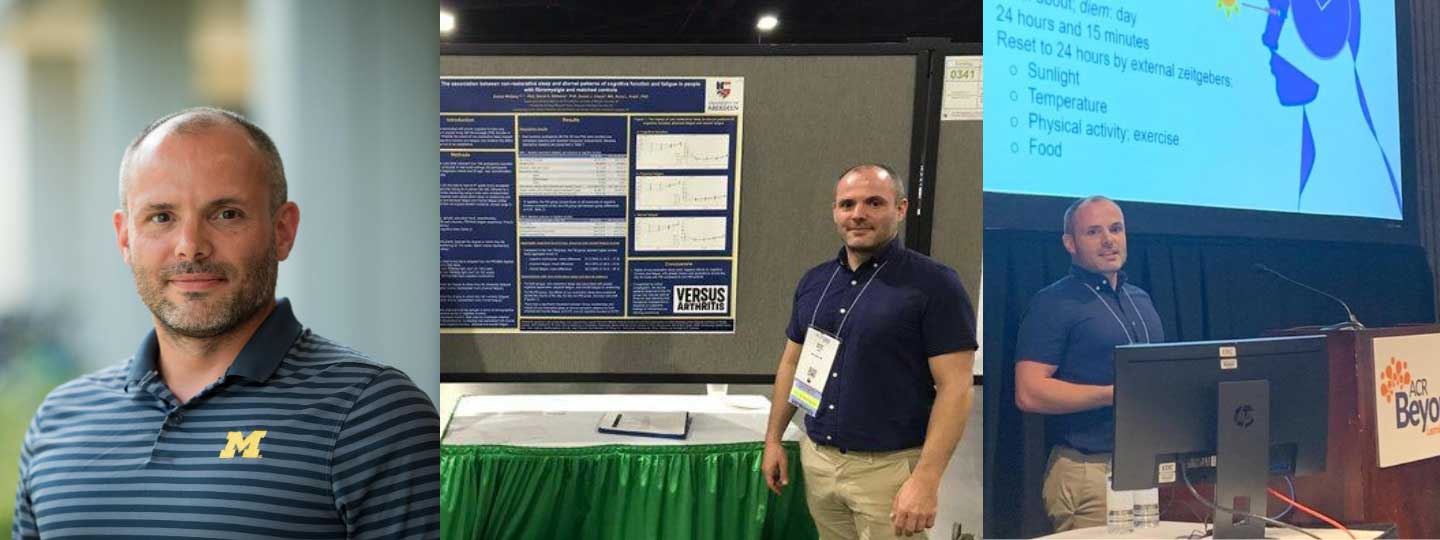Dr Daniel Whibley explores sleep, exercise and pain
19 August 2020
Dr Daniel Whibley is a Foundation Fellow Versus Arthritis investigating links between sleep, exercise, fatigue and pain.
As part of our ‘meet the researchers’ series, Dr Daniel Whibley shares what inspired his research and why the links between sleep, exercise and chronic pain are important for developing treatments for arthritis.
Read more about sleep and arthritis.
Why is research into sleep and exercise in chronic pain important?
Living with persistent pain can have a negative impact on both sleep and doing everyday tasks, including being active.
Getting good quality sleep and being able to do regular exercise are valuable goals and we know they can also have a positive impact on pain. This is why research into understanding and identifying the best ways to improve sleep and levels of activity are so important.
How they are related to each other – in those living with chronic pain, holds the potential to help develop better resources and support to improve these lifestyle behaviors and hopefully reduce pain.
Questions about how sleep can be improved and what kind of physical activity or exercise can support it, or how strategies like daytime napping can best be used remain unanswered. These questions sometimes keep me awake at night!
What are your research highlights?
Securing a Foundation Fellowship (a funding scheme from Versus Arthritis for researchers to develop independent research ideas at an early stage in their career) has definitely been the highlight of my research career so far. I’m at an early stage of the Foundation Fellowship so the outcomes of my research are yet to come.
I’m really excited about the results from our study that’s investigated how sleep experiences impact on how pain and fatigue fluctuates throughout the day in older people living with osteoarthritis.
I’m also excited about involvement in a project that is using an innovative technique to measure cognitive function in people living with fibromyalgia to better understand ‘fibro fog’. Watch this space!
What motivates you as a researcher?
The greatest motivators are the interactions that I have with people living with chronic pain.
Working as a physiotherapist and then as a researcher, it’s been very clear that people will give anything a go if there’s the possibility that it may help them manage their pain. This inspires me to develop new approaches to pain management.
Tell us a bit about your background
I trained as a physiotherapist at St George’s, University of London. During this time, I was encouraged by inspirational lecturers and researchers to develop a career in research.
I made the move to Scotland to undertake a PhD within the Epidemiology Group at the University of Aberdeen.
My PhD made use of data that was collected for the Versus Arthritis-funded Arm Pain trial and developed my research interest in the non-drug management of the symptoms of rheumatic and musculoskeletal disease.
What are your plans for the future?
I plan to continue to research and better understand the symptoms of rheumatic and musculoskeletal diseases. For example, pain, fatigue and sleep quality.
I hope to use results from this research to develop effective tools to help people to minimize the negative impact of these symptoms.
Just before the impact of Coronavirus was apparent, I conducted a series of focus groups with patients to identify the best way of delivering the hybrid sleep and exercise intervention that I’m developing.
I believe that the intervention (focused on optimising balanced sleep and physical activity behaviours for those with chronic pain) is even more important now.
Part of this process will involve using remote methods to conduct some parts of the trial that I had originally planned to undertake in person (e.g. an initial physical assessment).
In addition, I’ve started to work with the University of Aberdeen on a study of the effects of lockdown on the physical, psychological, and occupational health of those with rheumatic and musculoskeletal diseases. Read more about the study of the impact of COVID-19 during lockdown.
What advice would you give to someone looking to pursue a career in research?
Don’t be shy - contact researchers to see if you can get involved.
As a physiotherapy student I knew I wanted to get into research but thought it was something other people did. Once I started letting people know about my interest, opportunities were abundant.
You don’t have to be a student or healthcare worker to want to get involved in research.
I’ve been lucky enough to work with a patient advocate from Canada and Debra Dulake, an awe-inspiring Versus Arthritis patient insight partner who’s helping to shape our research into sleep management for people living with fibromyalgia.
Working with and talking to people who live with arthritis are essential to make sure we’re asking the right questions in our research.
Find more details about Dr Daniel Whibley's research and the science by reading his publications.
Find out more about our research
Read more about Dr Daniel Whibley's research into exercise, sleep and the management of chronic pain.
We’ll keep you posted on progress and updates. In the meantime, find out more about our research.
We’re here whenever you need us.
- If you would like to talk to someone, you can call our free helpline on 0800 5200 520 (Monday to Friday, 9am to 8pm)
- Join our online community
- Stay in touch and follow us on Twitter, Facebook and Instagram.